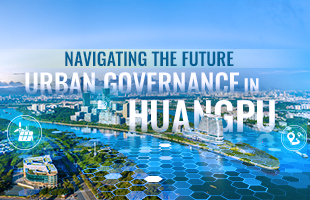Huangpu seeks coordinated development with Hengqin, Qianhai
Updated : 2022-04-19
Huangpu district is home to more than 1,000 scientific research institutes. [Photo by Jia Zihao]
Guangzhou's Huangpu district will fully support the construction of the Guangdong-Macao In-Depth Cooperation Zone in Hengqin and the Qianhai Shenzhen-Hong Kong Modern Service Industry Cooperation Zone to support building a core hub for global sci-tech innovation in the Guangdong-Hong Kong-Macao Greater Bay Area.
It was put forward in a recently released action plan by Huangpu district that the district will carry out coordinated sci-tech innovation with Hengqin and Qianhai by building sci-tech innovation platforms, launching mechanism innovations, transforming sci-tech outcomes, as well as promoting intellectual property reform.
Huangpu is an important node on the Guangzhou-Shenzhen-Hong Kong-Macao science and technology innovation corridor. It is now home to more than 1,000 scientific research institutes with 106 academicians of the Chinese Academy of Sciences and the Chinese Academy of Engineering, as well as 1,204 high-caliber talents. Huangpu also possesses half of Guangdong's high-level innovation research institutes.
Major platforms, such as the China-Singapore Guangzhou Knowledge City and the Guangzhou-Hong Kong Smart Manufacturing Cooperation Zone, will be supported to team with Hengqin and Qianhai. Huangpu will also share instruments for major sci-tech innovation platforms, including human cell lineages and aircraft tires, with the two zones.
Scientific research institutes and enterprises in Huangpu, Hengqin, as well as Qianhai will receive support to work with others in solving major technical problems in fields of priority to bolster development in the Greater Bay Area. In addition, a data base for the outcome transformation of major research will be built.
Huangpu will move forward cooperation with the two zones in advanced manufacturing. Detailed measures were outlined in the document. For example, manufacturing companies in the three areas are encouraged to purchase each other's products, while more technical exchanges related to hydrogen energy, green and low-carbon technologies, as well as environmental governance will be deepened.
- Investment and Entrepreneurship
- Investment Advantages
- Investment Guide
- Policies
- Key Projects
- Major Industries
- Industrial Parks
- Investment Opportunities
- Technological Innovation
- IPR
- Enterprises
- Talents
All rights reserved. Presented by China Daily
粤ICP备16087157号-1










